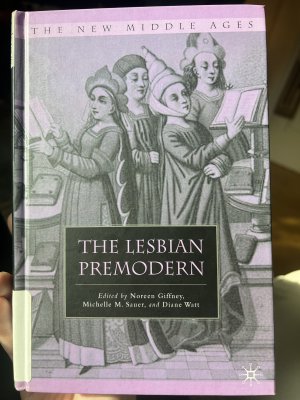Nobody wrote about forest food like Brian Jacques.Loved the Redwall books when I was a kid. Definitely second this recommendation. EULALIA!!!!!!
Martin the Warrior, etc. What a wonderful series of books. I loved reading them to both of our kids.
Nobody wrote about forest food like Brian Jacques.Loved the Redwall books when I was a kid. Definitely second this recommendation. EULALIA!!!!!!

In addition to a search for the historian's documentary evidence, we can acknowledge what I'll call "the undocumented lesbian premodern." Let me provide two scenarios. The first one plays with symbols and metaphors well known in the Middle Ages; the second assays medieval speakers and audiences. Consider what happens when a medieval female reads a manuscript. Since the text or page is gendered feminine in medieval discourse (i.e., pagina, folio), when a woman reads, moves her eyes across all the intricacies of the page, touches the page and holds it in her hands, turns it over, follows its lines with her fingers to guide her eyes so that both fingers and eyes caress across and down the page, could we discover an additional way of thinking about the intersections of lesbian-queer studies and medieval studies? If a woman takes up a quill, a pen, or a stylo and writes, is she giving pleasure to the feminized page with a symbolic dildo? Pursuing similar questions, Anna Kłosowska has conducted a related analysis of women dismembering and reconstructing late medieval books in Queer Love in the Middle Ages. And Lara Farina, in Erotic Discourse and Early English Religious Writing, has located erotic tropes and possibilities for erotic reading in devotional and instructional texts. 3 In the visual field, we could consider the allegorical figure, Rhetorica, always allegorized as a woman in both written and visual representations. The fifteenth-century manuscript painting Lez douze dames de rhetorique depicts Rhetorica penetrating Earth (terra) with her pick or chisel to mine sparkling gems of eloquence for language (lingua). Here, could we see a lesbian erotic?

The overcoat is likely the most important story in russian literature, in regards to what it allowed to come after. It's also what Dostoevsky claims in so many words: "We all came out from beneath the overcoat".I have been reading Best Russian Short Stories (collected by Thomas Seltzer) on and off for a year or two.
The very first story was The Queen of Spades, a disappointing read because I was led to suppose there would be more to the story, it ended with a jarring abruptness.
Nikolai Gogol's The Cloak was very well-written, even if it ended drearily after what seems to be the fashion of Russian stories.
But the real stand-out so far is Maxim Gorky's Her Lover, it's a gut punch in literary form. This story is the reason I'm writing this post, it's the sort of story one would like to recommend to everyone any chance one could get.
On a related note there's this Prequel by Rachel Maddow. It's about US fascism in the 1930s.Hitler's American Friends, which is hit and miss. It addresses "German sympathizers" in the United States in the 1930s-1940s, which is encompasses ethnic Germans who supported the "new Germany"; those whose political and economic interests made them interested in fascism; non-interventionists, and American companies with private interests in Germany. Many of the characters the author is highlighting are interesting in themselves, but his handling of them is clumsy. He refers to Coughlin's 16 points as "fascist", but the only descriptions I can find of Coughlin's "sixteen points" are fairly vague: the most substantial content I've turned up is a 1965 biography of Coughlin that was sharply critical of his antisemitism, but referred to the economic plan as "reform capitalism" or "mild socialism", with aspects of agrarianism and presumably some distributist influence.
On a related note there's this Prequel by Rachel Maddow. It's about US fascism in the 1930s.
EULALIAAAAA!Nobody wrote about forest food like Brian Jacques.
Martin the Warrior, etc. What a wonderful series of books. I loved reading them to both of our kids.
